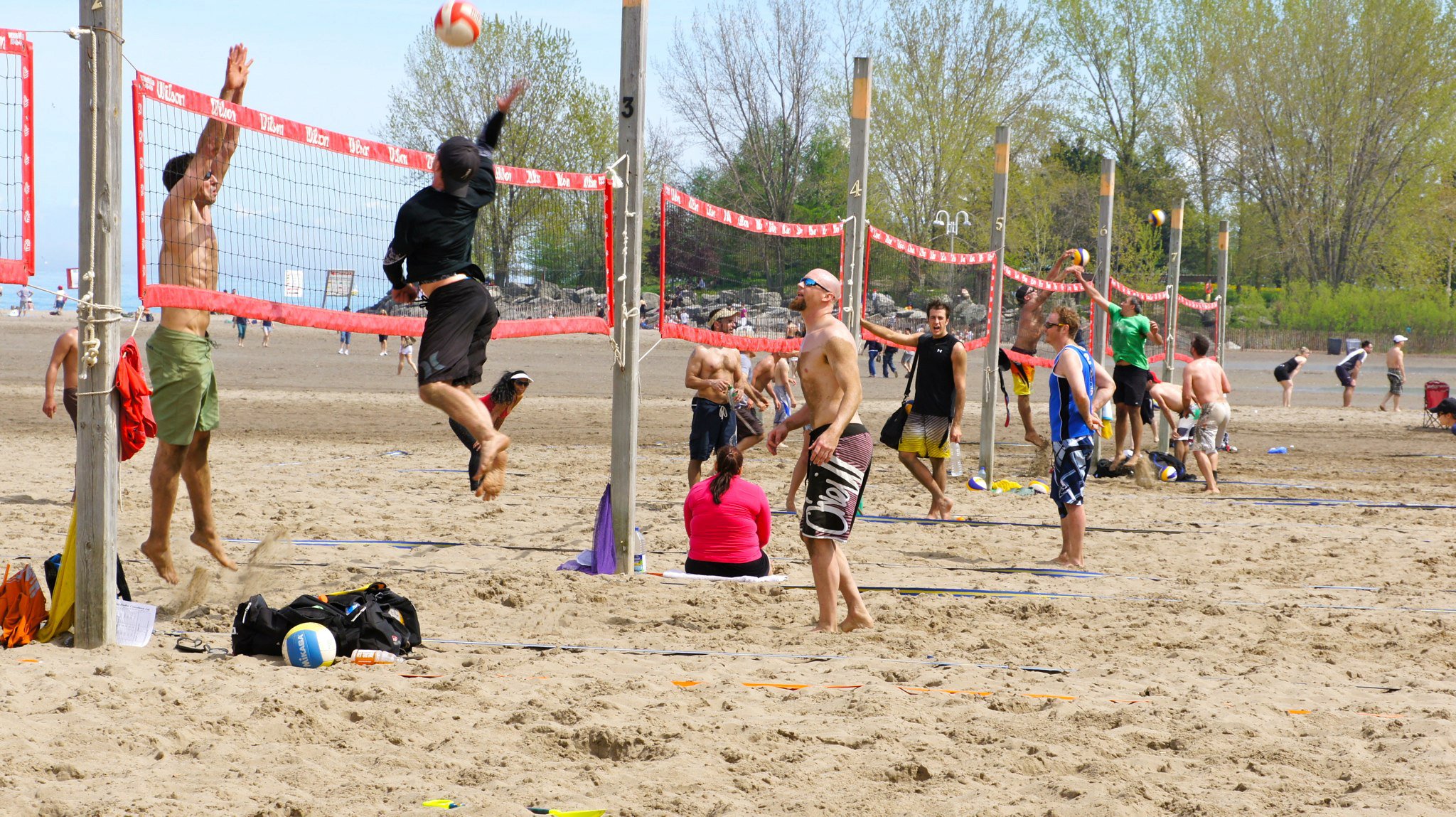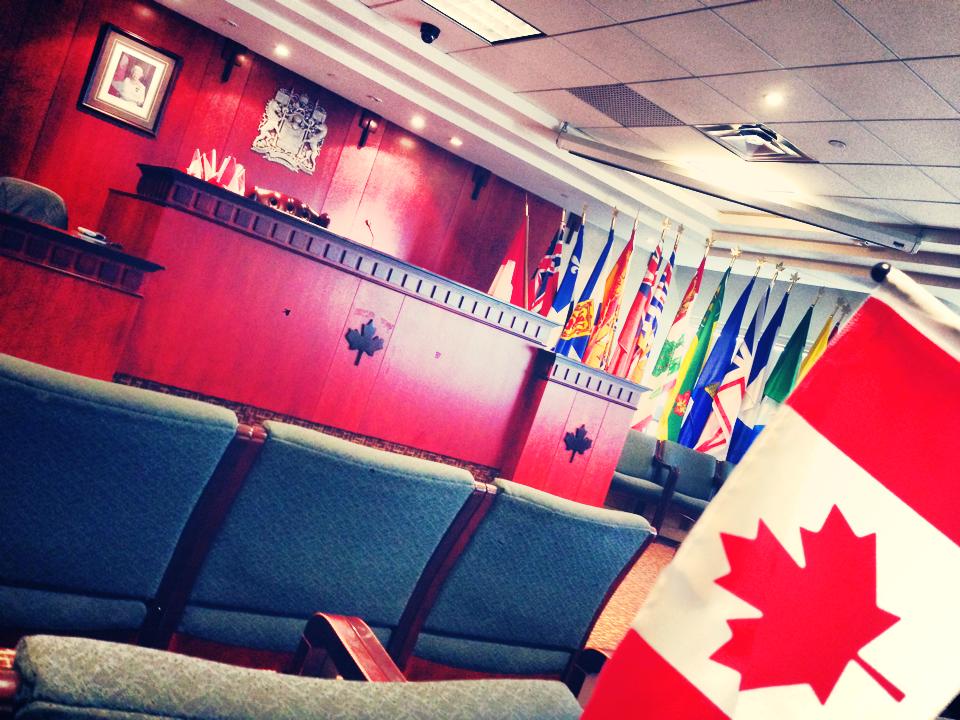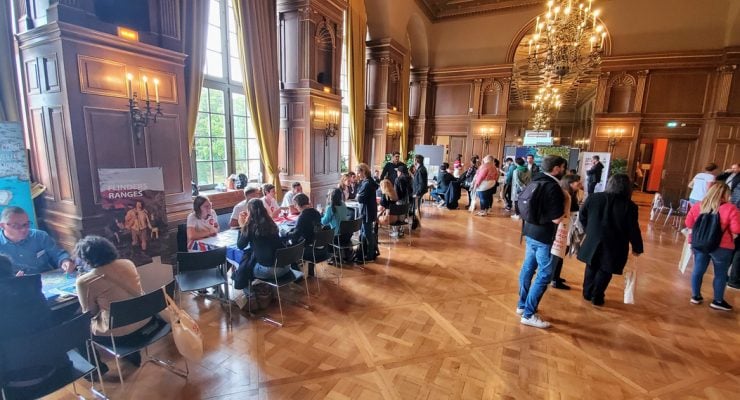Mathieu came to Canada with a Working Holiday Permit in 2005—16 years later, he’s still living in Toronto, but as a Canadian citizen. In this interview, Mathieu shares his personal and professional journey.

At that time, I was 22, I had always lived with my parents and I had just found a job with a pretty good salary. I didn’t want to leave France, especially because I was looking into getting my own place. And to be honest, I had never pictured myself living abroad. But Julie insisted it was the right move and we talked about it for several weeks—she had just graduated from university and she had a brand-new foreign language degree, so work experience abroad would be an asset on her resume. “Hey, why not?” I told myself after a while.
Back in 2005, applicants could go to the Canadian embassy in person and get their Working Holiday permit the same day. Obviously, we didn’t know that, we sent everything by mail and it took a few weeks for our application to be processed. One day, Julie called me—she was ecstatic over the phone, she had just received her passport with the permit in it. I checked my mail as well—I had gotten mine too. I had neutral feelings about it. I guess I didn’t quite realize what getting my Working Holiday Permit actually entailed.
Then we had to pick a destination and buy plane tickets. Montreal wasn’t a great option since we were two native French speakers eager to practise English. The other two obvious options were Toronto or Ottawa. Someone told me that Ottawa was a very bilingual city, so again too much French around for us. So Toronto it was!


I’d say that it is a good idea if you plan to take intensive English classes for a month, for instance. That way you can just dive in and practice what you learn in class. This option requires additional savings, though, because you’ll have to pay for classes and survive without finding a job for a little while. But life can get really complicated if you come to Toronto without speaking much English and without taking classes. Julie helped me open a bank account, find a place to live and apply for my SIN—I’m not sure how I would have handled all that alone. The vast majority of people in Toronto do not speak French at all. As a result, once these initial “tricky” steps (“tricky” for someone who doesn’t speak English, pretty straightforward if you do), I somehow found my way in this new English-speaking environment without feeling stressed out. Stakes were lower when I was talking to a cashier, a bus driver or a neighbour, so I wasn’t too stressed out about my English. I don’t want to discourage anyone, but I’m not going to pretend it’s easy to live in an English-speaking city when you don’t speak English. I would say that it took me two years to get over my mental block and speak English more naturally. It’s also good to keep in mind that there are immigrants from all over the world in Toronto (Asians, Indians, Europeans, etc.) so nobody is going to make fun of your accent—it’s just one more accent in a city where many people speak English with an accent. People are cool with that. Your accent isn’t an issue (and I was lucky because somehow, French accent is somehow “valued”!). French speakers take note—your accent is seen as “classy”! Basically, my advice is to just get used to speaking English right away. Don’t try to be perfect, nobody is going to laugh at you. The first few weeks are crucial—practice, otherwise you may develop a mental block and it takes a while to get over it.
After that, I had several work permits through the job I had found.
I started the permanent resident process in 2009 and it only took me a few months to get it. I applied through the Canadian experience class (CEC), later integrated in 2015 into the Express Entry system.
I applied for Canadian citizenship in 2014 and the process took a few months. For more practical information about the citizenship process, you can read Becoming a Canadian citizen (in French).

Eventually, Julie secured a position as a French-as-a-second-language teacher for adults at Berlitz. The Canadian job market is all about networking, so she recommended me for an interview and I also became a French teacher. The best part was, as a teacher, I could join English classes for free—basically I was making money and working on my English.
We also signed up with several staffing agencies about two months after arriving in Toronto. My first contract was as a French-speaking outbound call centre agent—not exactly my dream job but I was getting paid $14/hour, which was pretty good at the time. I found a part-time position in my field three weeks later—I moved on to a junior IT specialist at the Collège Boréal.
I was eventually hired as a full-time IT specialist nine months after we arrived in Canada. The company I was working for was hiring many French Canadians—it helped me land the job and it was also a great environment to learn more about Canadian culture.
Working Holiday Permit holders I’m talking to often report that it’s much, much easier to find a job when you speak both French and English. And if you’re not comfortable in English, well, it’s a bit of a gamble. Some are lucky, others aren’t and there’s a bit of a stigma to admit that you just can’t find a job. I can’t stress it enough, this is an English-speaking environment and if you’re not comfortable in English, life gets complicated pretty fast. Just making a call is difficult. It’s a vicious circle. French speakers can always head to Montreal as a “backup plan” but many Working Holiday Permit holders are discouraged enough to go home.
Oh, and on a somewhat unrelated note, people often ask me about freelancing in Canada. I find this option much easier to manage than in France.
During the interview, I showed him Pvististes.net and all the work I was doing on the website, which was basically just a side project. I think it was an asset during this interview.
Now keep in mind that in Canada, you can get hired very quickly, but you can also be laid off very easily. There’s less at stake during interviews for HR and management. You’ll get hired if the first impression is positive and if it doesn’t work out, well, you’ll be shown the way out.
I eventually moved on to another position a year later and I started with a much better salary.
I’m the IT guy. I handle technical issues, I implement new features, I worked on our mobile app, etc. I also help out for specific projects like our 2016 Pvtistes Tour and our 2016 and 2019 Salons du PVT. I worked on the event website.
I don’t regret a thing. Sure, times were tough but it ended up being a constructive experience. It gives you confidence afterwards because hey, you managed to overcome challenges and work things out. I wasn’t as self-motivated when I was living in France. Back then, if I had no money, I would just stay home instead of going out with friends. I was living with my parents, my basic needs were covered. But in Canada, running out of money meant having to go home. The stakes were higher.

 Now 16 years later, I find I don’t have many friends left back there—long-distance friendship isn’t easy over the years. I can count my French friends on one hand. I miss my parents as well, I wish I could be there to help them from time to time. And it’s hard picturing myself as a dad without my relatives around.
Now 16 years later, I find I don’t have many friends left back there—long-distance friendship isn’t easy over the years. I can count my French friends on one hand. I miss my parents as well, I wish I could be there to help them from time to time. And it’s hard picturing myself as a dad without my relatives around.
I know, this is probably anecdotal but this is my personal experience. I play squash with people I’m friendly with, for instance, but we never see each other outside of squash. On the other hand, I met one of my friends at a gas station. I told him his car was cool, we started talking, exchanged email addresses and now we see each other often.



Some Working Holiday Permit holders avoid fellow citizens because they claim they didn’t come to Canada to hang out with people they would meet at home. That kind of attitude only lasts so long, though. After a few months or a few years in Canada, you tend to get closer to your community because relationships are easier in many ways. Even if you’re perfectly bilingual, chatting with other French people if you’re French comes easily because you’re sharing the same sense of humour—especially the art of being ironic—, the same background, because you can discuss French politics, etc. It can be tricky to talk about “touchy” matters with Canadians, they don’t like to debate as much as French and they tend to politely agree. French people can argue about politics and yes, get into heated discussions but remain friends. Speaking your mother tongue feels good as well. It just rolls off your tongue, you don’t have to think about the best way to express yourself. Spending a night out speaking English if it’s not a language you’ve mastered can be exhausting—maybe you’re not expressing yourself well, maybe you didn’t get the joke, etc.
That said, it’s worth keeping in mind that people in Toronto come from all over the world. There’s a real mix of cultures here. The other day, someone told me about a French guy who complained on Facebook that Toronto was “too cosmopolitan.” I really don’t understand what he meant. It’s the opposite mindset of a city like Toronto… Sure, there are ethnic neighbourhoods, entire communities of Italians, Portuguese, Greeks, etc., but people mingle in daily aspects of life. This is one of Canada’s big asset—“fitting in” is pretty easy. There are French communities too, and I don’t think hanging out with people from your community is a problem when you’re also trying to fit in as a new Canadian. One thing I like here is that during the World Cup, for example, people cheer for a variety of teams, often their home country team. They put two flags on their car—home country and Canada. You really feel that people are proud to be Canadian, no matter where they’re from originally. To them, immigrating to Canada is an opportunity, they’re kind of grateful, I would say.
We lived with our parents in France. We didn’t have bills to pay, life was easy. And suddenly we had to handle life as new Working Holiday Permit holders. It was a very formative experience. If you fail, well you learn and don’t fail again.
I mean, I wasn’t exactly the perfect fit for a new life in Canada and to find work in my field but it ended up working out. I don’t want to sell the “Canadian dream” but I’d like to tell people who don’t speak English well or who don’t have a degree that being resourceful and proactive may be more important than having the perfect background.

July 26, 2021, edit: I am now the father of a 3-year-old toddler born in Toronto. Her English accent is already better than mine—in a few years, it will be her turn to make fun of my French accent!












 Français
Français English
English





0 comments
{{like.username}}
Loading...
Load more